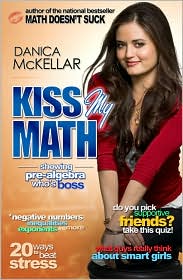|
YOUR
FILM REVIEWS
(Reviews on this page do not necessarily represent the views of
Hollywood Math and Science Film Consulting.)
Not Your Mother's Math Book
Review of Danica McKellar's Kiss My Math
by Jonathan David Farley, D.Phil.

Hollywood actress Danica McKellar and I have a history. In fact, we used to be quite close. What I mean to say is: I sat next to her once.
I met Danica McKellar in 2006 when she spoke at a symposium on women and mathematics that I helped organize at Stanford University. She was passionate and animated about the topic and still had much more to say when time constraints forced us to end the panel discussion.
I suppose she put some of what
she had left to say into her 2007 book, Math Doesn't Suck. I was
apprehensive when Danica sent me a draft of the book, since I
didn't know how a math book targeted toward tweenaged girls would
be received. Amazon.com, the Los Angeles Times, and ABC News proved
that I was too pessimistic. Danica's book became a best seller.
Danica McKellar is an unlikely exponent of math education. Not
only because she is an actress-she played a speechwriter with the
Dickensian name of "Elsie Snuffin" in the television
series The West Wing, she solves mysteries as "Inspector
Mom" on the Lifetime Channel, and her layout in Stuff Magazine
had many a math wonk adjusting his glasses-but also because she
actually co-authored a research-level mathematics paper (as an
undergraduate, no less; she graduated summa cum laude from the
University of California at Los Angeles). Few people who do serious
research in math at the university level are interested in what
goes on in schools.
Now Danica has written Kiss My Math: Showing Pre-Algebra Who's
Boss. As a mathematician, I did not need to brush up on the topics
too much—for instance, the opening chapter covers adding
and subtracting negative integers—however, in my own work
as an algebraist, I have learned to utilize some of the tips Danica
teaches in her book: about being careful with subtracting negative
numbers or subtracting expressions in parentheses, or about keeping
z's, 2's, 1's and 7's straight. Of course, the point is not whether
a professional mathematician finds the topics simple; Kiss My
Math covers many of the topics listed on the California state
standards for algebra, as well as additional fun topics like mean,
median, and mode, and graphing lines.
What truly distinguishes Kiss My Math from other books is its
tone. It playfully relates topics in math to experiences in girls'
everyday life (or so I'm told): absolute values are introduced
by way of a metaphor with spas; the distributive property is introduced
in a particularly nice way using costume parties. In most cases
the humor makes you smile; in some cases, laugh.
She also has interludes with stories from her life and the lives
of her acquaintances, showing how math can help you in your career.
While I have never argued that kids must learn math because they
will need it in their future careers, Danica makes a compelling
case. For example, she quotes an interior designer, who says that
"furniture layouts require dimensioning (this involves adding
fractions). To obtain square footage of floor plates, we have
to calculate areas of triangles, parallelograms, and other geometries.
When designing for law firms, calculations are also required when
comparing ratios-for instance, how many secretaries there are
per lawyer—so we can figure out how to best arrange the
offices."
I especially liked her story about saving cash at a clothing store—the
cashier had overcharged her, ringing up one item twice by doing
some mental arithmetic. (I did the same thing at a McDonald's
once; but no one was impressed.) Danica also has good tips on
how to keep terms straight when simplifying monomial sums and
differences; she even has tips on organizing your time which I
myself might put to use.
The only sidebar that was out of place was one on fitness tips.
It had nothing to do with math. On the other hand, the sidebar
about whether boys like girls who dumb themselves down also had
little to do with math, but I felt it was entirely appropriate,
as well as other instructional tidbits about self-esteem. Since
this book is intended for a slightly older audience, I thought
the focus on boys and dating was acceptable.
I liked the way Danica mentions the associative, commutative,
and distributive properties, as well as identities. (The commutative
law says that a+b=b+a and a x b = b x a.) As with her first book,
however, I wish she had gone one step further and mentioned more
advanced topics, in this case, group theory. I also feel she is
not careful enough about cautioning readers against dividing by
zero (although admittedly, as she pointed out to me, she does
warn against dividing by zero at least five times between pages
115 to 120, so perhaps I am being unfair).
Otherwise, Danica paid careful attention even to the graphic design
of the book: false statements are printed in grey, the "Mirror
Rule for Inequality Symbols" is printed in black for extra
emphasis.
Hopefully the book will be adopted by school districts and bought
by parents. As Kiss My Math nicely dovetails with Math Doesn't
Suck, I suspect we will see several more books in the series.
Professor Jonathan David Farley
is in the Department of Mathematics at the California Institute
of Technology. Kiss My Math: Showing Pre-Algebra Who's Boss is
published by Hudson Street Press and hits bookstores August 21,
2008 in the United Kingdom and August 5 in the United States.
<< Return
to Your Film Reviews
|